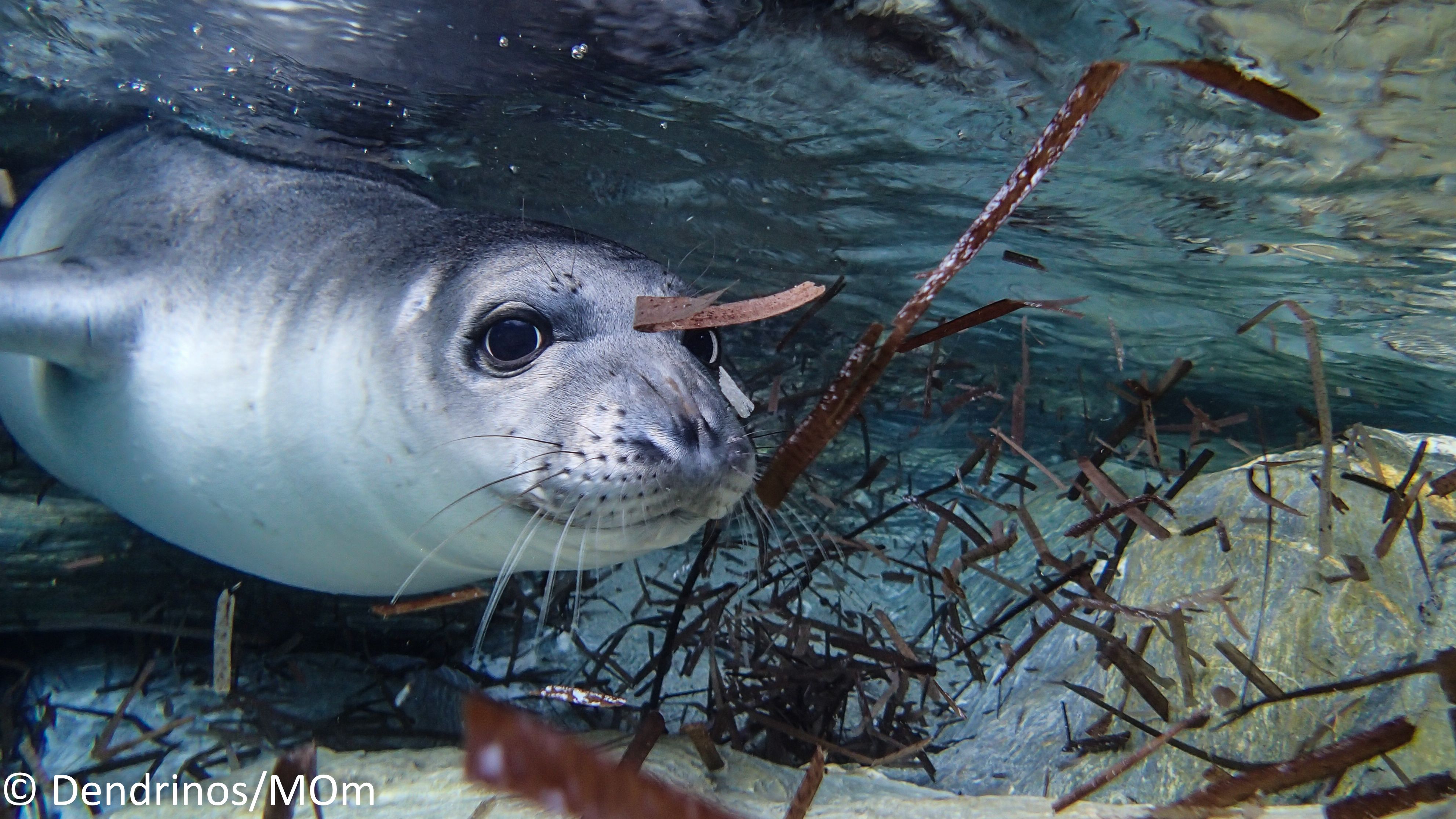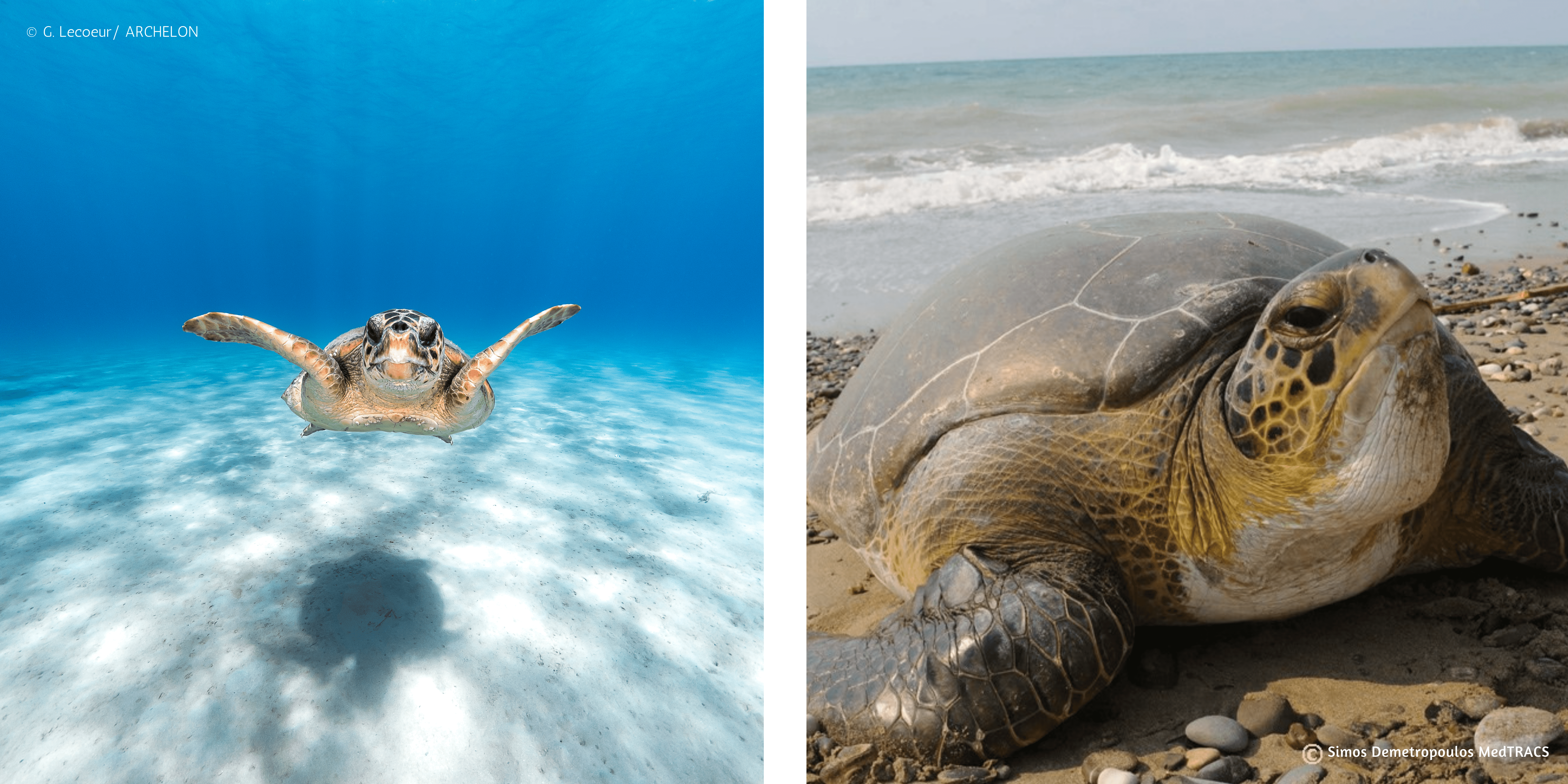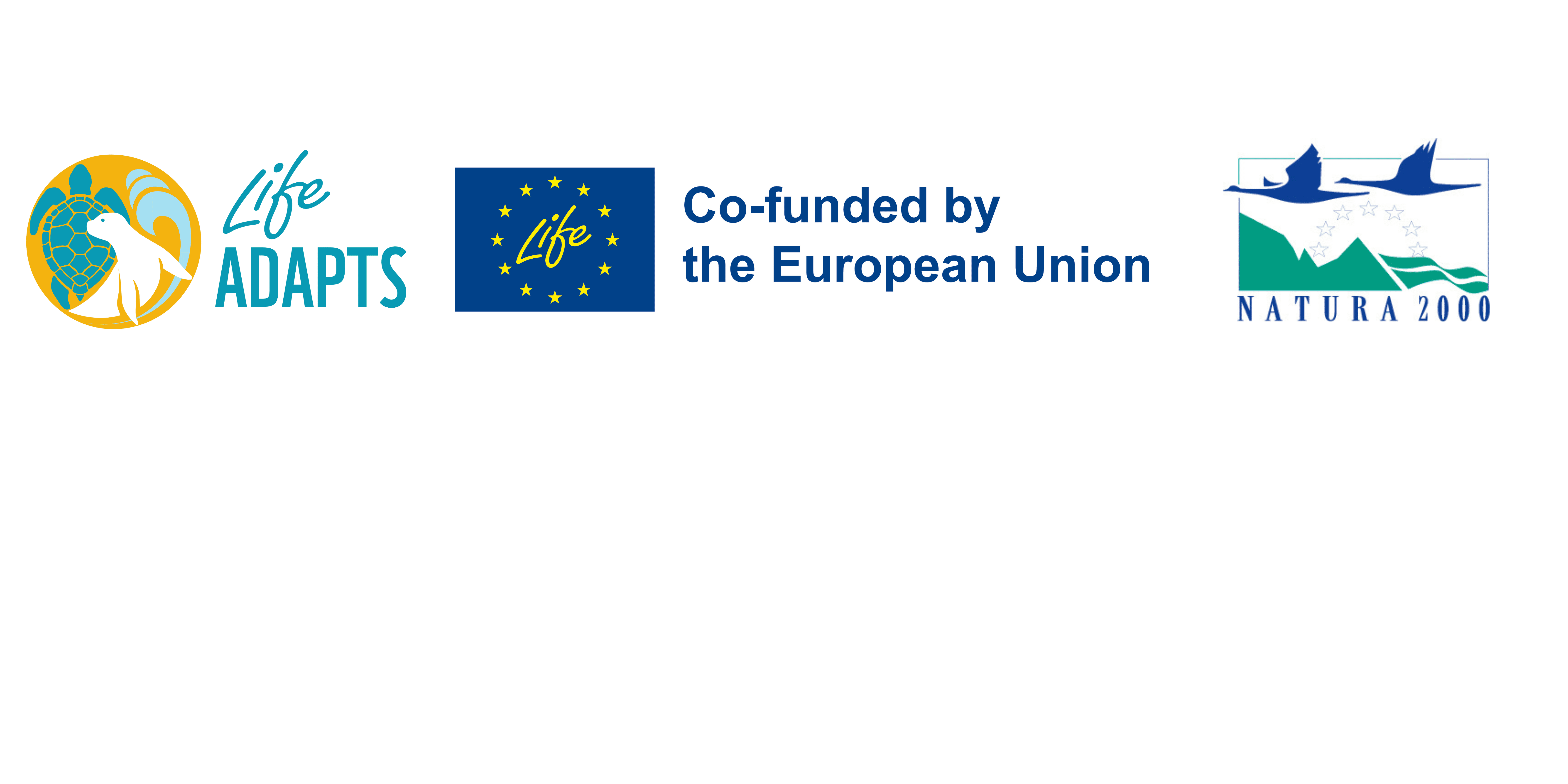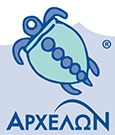Biologists from the 'LIFE ADAPTS' project send their message to the community
Finding potential pathways for adapting to the climate crisis in three Mediterranean countries—Italy, Greece, and Cyprus—where key areas have been identified for the life and reproduction of three iconic species of the Mediterranean: the green turtle (Chelonia mydas), the loggerhead turtle (Caretta caretta), and the Mediterranean monk seal (Monachus monachus).
These same adaptation pathways for these species can also inspire coastal human communities in the future: this is the message launched by some of the young biologists collaborating on the LIFE ADAPTS (Climate Change ADAptations to Protect Turtles and Monk Seals) project, recently launched and co-funded by the European Union. This project coincides with EUROPEAN RESEARCHERS' NIGHT, an important event for scientific dissemination and participation promoted by the European Commission since 2005.
In their video messages, the young researchers also emphasized the importance of research both for protecting endangered species and for addressing the effects of the climate crisis, and the need to engage citizens as fully as possible. The fate of coastal communities will depend on how they address the effects of the climate crisis, such as rising sea levels, global warming, and the consequences for the distribution of breeding and feeding habitats such as caves, beaches, and open seas.

RESEARCHERS IN THE FIELD
The young researchers, joined on the project by colleagues from Italy, Greece, Cyprus (to be adapted for each country), are working to identify breeding sites by monitoring beaches on foot or with drones and caves with camera/video traps. They are also developing a risk index for sea level rise in breeding sites by profiling beaches with drones and caves with video mapping and using data loggers to record beach and nest temperatures. They are also collecting data on incubation periods and histological analyses on turtle hatchlings to then develop a warming/feminization risk index. Finally, to identify key marine areas for the project's species, they are using satellite transmitters for turtles and eDNA (environmental DNA) for monk seals.
Alongside the researchers, volunteers, divers, boaters, and boat owners are involved in hundreds of citizen science activities: one of the project's key focuses is the involvement of the affected communities, along with local institutions, as key stakeholders in achieving the project's objectives.
-
Paolo Casale, Associate Professor of Zoology and Scientific Coordinator of the project, states: "The LIFE ADAPTS project exemplifies the importance of scientific research for the conservation of species and habitats. Identifying priorities for action is essential to optimize available conservation resources, especially for far-reaching anthropogenic threats, such as climate change. Recognizing the inevitability of such changes, the project aims to identify areas of the Mediterranean that, if preserved, could play a key role in the future for sea turtle and monk seal populations."
-
Laura Pintore, a researcher at the Marine Office and scientific director of the project for WWF Italy, adds, "Together with other researchers collaborating on the project, we are trying to find ways to support the response to the climate crisis for these iconic species."
FIELD EXPERIENCE
- From Sicily, Oleana Prato, marine biologist with WWF Italy, delivers her message from the beach of Granelli (Syracuse), just after an inspection coinciding with one of the exciting hatchings of Caretta caretta turtles, which allowed 98 hatchlings, after 58 days of incubation, to conquer the sea: "I collaborate on this project, which has allowed us to survey over 270 nests this year, a record for Sicily, and to protect the turtles' nesting habitats, because solutions to climate change are not only useful to them, but also to us!"
- From Crete George Vrampas**, Project Manager for Rethymno and Messara at ARCHELON says:
"Every time I see a hatchling reach the sea, I realize how important this work is not only for the turtles, but for the entire natural world we depend on." - From the Policoro Oasis in Basilicata, where the WWF manages one of its Turtle Recovery Centers, Giovanni Galluzzo, a biologist at the Center, states, "In the project, I'm involved in monitoring the beaches to identify traces of sea turtle nesting, securing the nests, and guarding them until the hatchlings hatch. The best moments are those related to raising public awareness of the need to protect this species. Indeed, each of us can do a lot to protect this species."
- From Sardinia, where the fifth edition of Monk Seal Week took place in La Maddalena (Sassari), organized by the Gruppo Foca Monaca APS in collaboration with Area11 Diving Center as part of the project's activities, Sofia Bonicalza of the Gruppo Foca Monaca and scientific director for the project: "We study monk seal habitats to understand how climate change affects them, and we promote the involvement of local communities: nature conservation and human communities are closely linked. The climate crisis: solutions for animals can also be good for us!"
The team is coordinated by the Department of Biology of the University of Pisa and includes research bodies, institutions, associations specialised in the protection of the three species, experts and researchers. Seven other partners are involved: WWF Italy and Gruppo Foca Monaca in Italy, ARCHELON (The Sea Turtle Protection Society of Greece) and MOm (Hellenic Society for the Study and Protection of the Monk Seal) in Greece and MEDTRACS (Mediterranean Turtle Research and Conservation Society), the Oceanography Center of the University of Cyprus (OC-UCY) and the Department for Fisheries and Marine Research of the Ministry of Agriculture, Rural Development and the Environment (DFMR) in Cyprus.

**CLIMATE EFFECT ON SEA TURTLES AND MONK SEALS **
Sandy coasts used by marine turtles as nesting ground and caves chosen by monk seals for breeding face risks linked to the effects of the ongoing climate crisis: these two types of sites are influenced, for example, by sea level rise which could cause their disappearance or reduce their potential. Furthermore, the increase in sand temperatures can cause a "feminisation" effect for sea turtles (increase in the percentage of female individuals in hatches).
Rising sea levels due to global warming could lead to the flooding of monk seal pupping caves, resulting in the loss of these critical habitats for a successful reproduction of these animals. This could lead to reduction of pups produced, with consequent reduction of genetic diversity and potentially resulting in population decline. At sea, climate change also affects food availability and can cause changes in the distribution of feeding areas and the availability of resources, such as, for example, with the increase in alien species. Having a clear picture of the potential changes in advance and implementing the adaptive measures developed during the project will allow us to protect these iconic Mediterranean species more effectively in the future.
Watch the messages:
For more information: https://archelon.gr/en/news/life-adapts
_LIFE ADAPTS (climate change ADAptations to Protect Turtles and monk Seals) is a multi-year project running until 2030 financed by the European Union within the LIFE programme. LIFE23-NAT-IT-LIFE ADAPTS GA n. 101148207.”

Turtles, Dolphins, and Birds: Local Communities and Scientists come together for the future of Amvrakikos Gulf
Aquila Rithymna Beach Hotel becomes an Advocate for ARCHELON in Rethymno
RECENT NEWS
- OUR NEWS18/02/2026
"The Mediterranean We Protect" ARCHELON Presented the 2025 Results and the New LIFE MareNatura Exhibition
The presentation of our Accounts for 2025 was held with great success on Saturday, February 14th in Glyfada, honoring the people who are on the front lines for the protection of the Mediterranean.
- OUR NEWS11/02/2026
ARCHELON in the Lakonikos Bay: Nature, Research, Volunteering
The year 2025 was a milestone: a total of 1,253 nests were recorded and protected, while 7 female turtles were equipped with satellite transmitters, sending valuable data about their journeys across the Mediterranean.
- OUR NEWS23/01/2026
A turtle we treated 10 years ago was found in Spain!
“Castello” is a male Loggerhead turtle that was treated at our Rescue Centre in 2015. In 2025 he was found again at a Rescue Centre in Spain!
- OUR NEWS02/01/2026
Against All Odds: A Story of Marine Resilience from Amvrakikos Gulf
One turtle has been surviving for at least six years without a lower jaw!
- OUR NEWS29/12/2025
“Meetings with Remarkable Animals” A Heartwarming Reward for Our Efforts
Kristi Stassinopoulou shared with us a very personal moment: a sketch and a few pages from her book “Meetings with Remarkable Animals"
- OUR NEWS17/12/2025
ARCHELON’s Research: Expanding the Map of Mediterranean Green Turtles
In recent years, some green turtle nests have been recorded in Greece, indicating that the geographical spread of this species’ nesting areas in the Mediterranean is beginning to expand.
- OUR NEWS12/12/2025
The Power Behind Sea Turtle Conservation: Our 2025 Field Leaders
With deep gratitude, we honor all the Field Leaders who contributed to the success of the 2025 Field Projects.
- OUR NEWS10/12/2025
Unprecedented appearance of Leatherback Turtle on a Mediterranean beach
A new scientific record brings to light an extremely rare event for the marine life of the Mediterranean: the first confirmed appearance of an adult Leatherback Turtle (Dermochelys coriacea) attempting to nest in the Mediterranean basin.
- OUR NEWS08/12/2025
Applications Now Open for 2026 ARCHELON Field Leaders Posts!
ARCHELON is pleased to announce that applications are now open for the 2026 Field Leader positions across all nesting projects (applications open until January 31st).
- OUR NEWS05/12/2025
Saving Sea Turtles Together – A Tribute to Volunteers
On Volunteer Day, we take a moment to celebrate all those who came from near and far, put on the blue T-shirt, and embraced this important responsibility.
- OUR NEWS01/12/2025
Laganas Bay, Zakynthos: Successful Loggerhead Reproduction, Ongoing Habitat Problems
On the beaches of the Zakynthos National Marine Park, around 2,155 turtle nests successfully hatched thanks to active protection measures, but human pressures on coastal and marine habitats continue.
- OUR NEWS26/11/2025
A Second Chance: Two Loggerhead Sea Turtles Return to the Sea Thanks to Dedicated Rescues
This summer, two adult loggerhead sea turtles, ‘Aktaia’ and ‘Herbert’, arrived at ARCHELON’s Sea Turtle Rescue Centre needing urgent help after sustaining severe head injuries.
- OUR NEWS11/11/2025
Volunteering Projects 2026: Sea Turtles Need You, the Planet Needs Us!
ARCHELON welcomes volunteers from all over the world and of all ages (over 18) and no prior experience is required! If you speak English, are at least 18 years old, and are in good physical condition, you can do this!
- OUR NEWS10/11/2025
Outstanding Recognition for ARCHELON at the Effective Dialogue Conference 2025
On Thursday, November 6, 2025, ARCHELON received an honorary distinction for its substantial contribution to effective dialogue on sustainability, social responsibility, and the environment
- OUR NEWS06/11/2025
6th Year of Online Tours: The sea turtles are traveling across Greece once again!
Students from every corner of the country, as well as from international schools, have the opportunity to learn up close about the lives of the turtles cared for at the Sea Turtle Rescue Centre in Glyfada, Attica, and to discover how rescue efforts impact the marine world.

